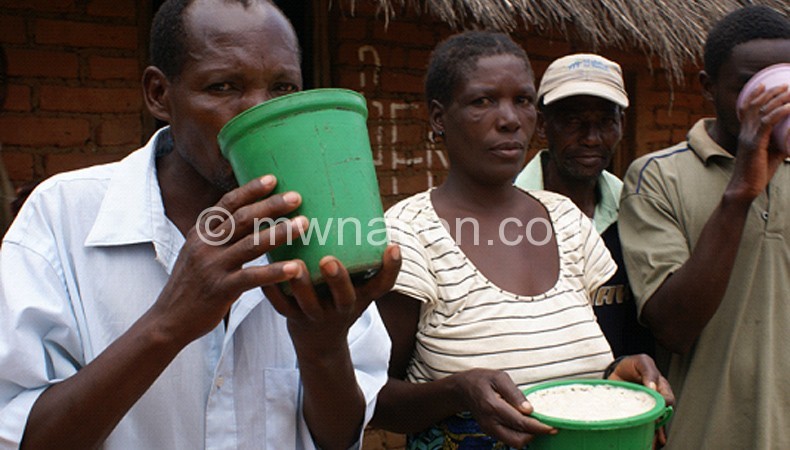The flipside of Chitipa’s beer shrines
It is local, opaque and a culture. Some say it is a cult, but all of them call their favourite poison Katata—the beer of togetherness.
Such is the potency of the traditional brew with thatched shrines that its ardent drinkers credit its popularity with making Chitipa a homely place to its sons and daughters.
 Made of either soaked millet or maize, it could as well be the reason the border setting remains in the league of the least developed districts in the country.
Made of either soaked millet or maize, it could as well be the reason the border setting remains in the league of the least developed districts in the country.
It was all there on a showery Monday 8am visit to the village in search of rural voices on land ownership laws, a burning issue that left a charged a village head seething: “You can get away with my wife, not an inch of my ancestral land.”
Then, some of the residents were spotted busy clearing the fields they seem ready to die for—at least while the rains last. However, at Kakululu Village, in the outskirts of the commercial hub of the district where one police officer-in-charge once banned beer sales before 12 noon, was also home to a crowd which smash to smithereens your textbook understanding of a day in the life of rural farmer.
Tens of the locals were happily downing the umpteenth bucketful of the foaming beer in the foreground of four church-like drinking joints where men and women were happily drinking, dancing, staggering and screaming on top of loud music as if they had been around all night long.
They call the thatched blocks ‘vilabu’, slang for ‘clubs’ and they are complete with a marketplace of boiled meats, beans, bananas and other delicacies to ensure nobody dies of drinking without eating.
“Every day, people make merry. Without this meeting place, I don’t know where people would be gathering for heart-to-heart discussions. What would become of those who rely on the market?” says Oliver Kandakayuni of Mwalala Village.
But it is only 8am—not yet nine!
Kandakayuni and company are just what they are—fans of their brew.
“Beer is our way of life,” he says. There is no churches and mosques in the vicinity.” The shrines of Katata open as early 6am and people guzzle until midnight if the booze endures, the locals say.
But there are bylaws which require the unorthodoxy joints to open earlier than 10am, says village head Kakululu.
“By 10am, those dying for a sip will have returned from their farms,” says the traditional leader, who set aside the buzzing spot for vilabu.
He praises the boozy gatherings for giving drinkers a rare opportunity to come together and talk about issues affecting them.
“With no bottlestore nearby, these vilabu is the only place one gets to share a bucket and stories with friends, relatives and even parents-in-law. Life here knows no age and gender,” he says.
Truly, visibly under-age boys and girls were spotted siphoning the traditional beer from the same plastic buckets as the age mates of their fathers and mothers.
The sight of women in the fray spectacularly discredits prevailing stereotypes that hold female imbibers icons of sexual immorality. Actually, Martha Mtambo brags: “Men and women in my village were already hanging out as equals when talk of gender equality reached the rest of the country.”
However, the Under-18 guzzling their sour stuff as elders mind their own sips leave onlookers wondering: “What good can come from the children high on alcohol and not books?”
According to Kakululu, the young ones allowed in clubs have either completed or dropped out of school.
“When you stop schooling, it means you are old enough to drink and to marry. What else can they do?” he argues.
But the misconception that dumping school makes boys men and girls women could be symptomatic of why early marriages and drunkenness are widespread in the district bordered by both Tanzania and Zambia.
Teachers say drunkenness is a major challenge to boychild education in the tricky terrain where up to six girls in 10 that enrol in primary schools hardly sit secondary school leaving examination.
But where do the goners go? One in two women aged around 20 married before their 18th birthday, a 2013 survey by UNFPA revealed.
Safeguarding the youth and the district from the retarding effect of alcoholism was the reason former police officer-in-charge John Nyondo banned morning binges and ordered pubs to open after 12 noon.
Sadly, the law and order Nyondo championed has been on the wane since last year when Nyondo was transferred to Mzuzu where he often evokes as one of his bragging rights.
“I banned reckless drinking in Chitipa. I will deal with those who sell kachasu and sachets of spirits in Mzuzu. The laws clearly prohibit producing and selling liquor without license. We only need strict law enforcement and parental guidance to end alcohol abuse,” he said at a public debate in November.
He was responding to a concerned mother who asked him: “What are you doing about proliferation of spirits which are killing our children?”
It is clear the combined power of law enforcement and parents’ role to end alcoholism is weakening—leaving behind smoke spiralling from the singular cop’s gutted dream of a renewed Chitipa where both rural and urban dwellers drink responsibly.





